COVID Support Force: the MOD’s contribution to the coronavirus response
On 18 March the Defence Secretary announced new measures to enable armed forces personnel to support public services in response to the coronavirus outbreak.
The COVID Support Force is currently supporting the public services to respond to the outbreak with the following activity.
Latest News
COVID Support Force
As of 5pm on 11 June, there were 3,610 military personnel committed to assist with 54 open MACA requests.
The MOD rebalances COVID Support Force in line with national response.
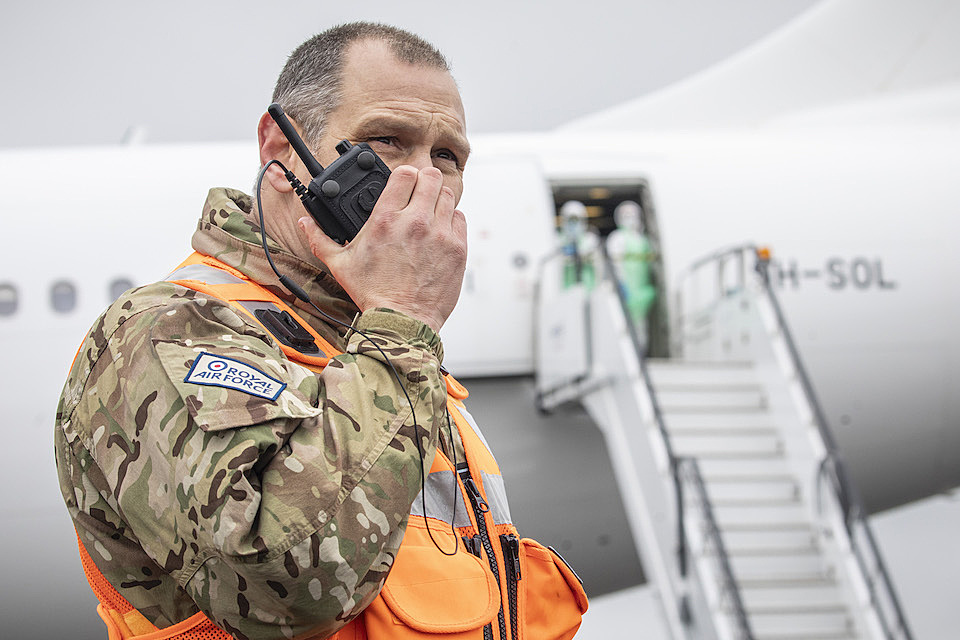
The Royal Air Force assisted in bringing home the passengers of a cruise ship which had encountered an outbreak of the coronavirus. MOD Crown Copyright.
Strengthening public services
Personnel at readiness
On 18 March the Defence Secretary announced the COVID Support Force (CSF) to assist public services with their response to the coronavirus outbreak. Initially, there were 20,000 UK Armed Forces personnel stood at readiness, with up to 4,000 committed on most days.
Due to the public’s adherence to the lockdown measures and the increasing ability of other government Departments to maintain essential services, from 20 May the MOD has begun to rebalance the CSF. It has been determined, in co-ordination with colleagues across government, that 7,500 personnel should now be kept at readiness to fulfil current tasks and respond to future demand. This number will be kept under review as we continue our fight against COVID-19.
Military reservists remain a key part of the CSF. Used in a range of activities, from providing medical and logistical support to deploying their own professional skills, such as accounting and construction, only those with specialist skills that can meet current requests from other government departments are currently being called out.
The CSF will continue assisting civilian authorities wherever required and no personnel will be withdrawn from tasks while the demand remains. The 12,500 being released will be returning to a range of normal duties, including preparations to deploy on future operations at home and overseas.
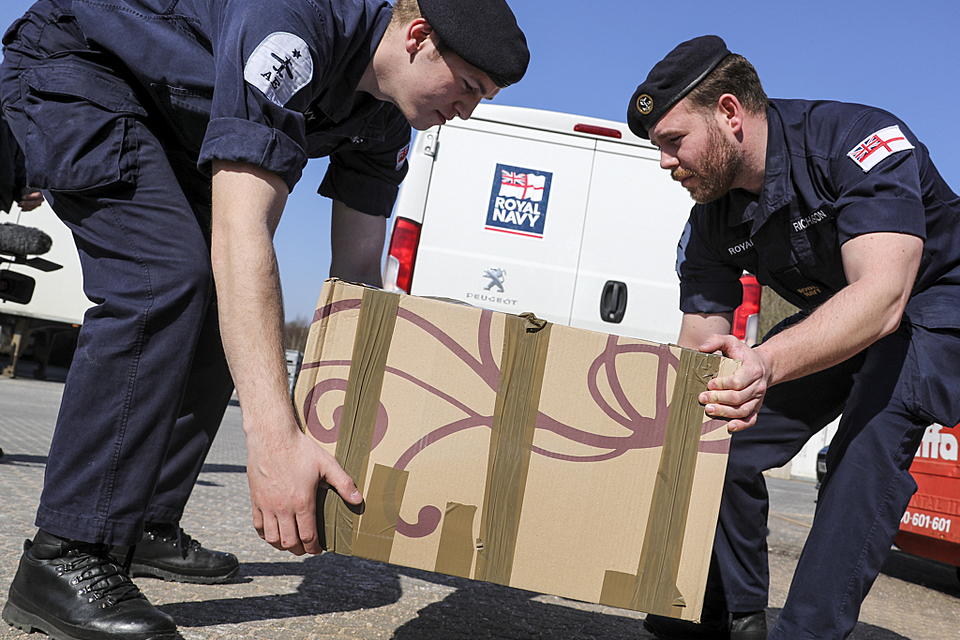
Royal Navy sailors load specialist testing equipment to deliver to the NHS. MOD Crown Copyright.
Tackling Disinformation
A small team from the Ministry of Defence, including members of 77 Brigade, is supporting the Cabinet Office’s Rapid Response Unit in its efforts to tackle disinformation. Together, they are combatting a range of harmful online narratives – from purported ‘experts’ issuing dangerous misinformation to criminal fraudsters running fishing scams.
Support for Police Services
A team from the 4th Regiment Royal Logistics Corps is assisting the UK Police with its PPE distribution. With all requests now being sent through a central supply chain, based at the new National Police Central Logistics Hub in Oxfordshire, police officers and staff will continue to receive the very best protection to mitigate the risks presented by public-facing roles during the COVID-19 pandemic.
Whilst the UK Armed Forces stand ready to assist public authorities if required, there are currently no plans for the military to participate in the enforcement of public order.
Planning Support
The UK Armed Forces have deployed dozens of military planners across the UK. Working with Local Resilience Forums and Partnerships, alongside the Emergency Co-ordination Centres in Scotland and Wales, they are supporting public services, local authorities and emergency services as they respond to the coronavirus outbreak.
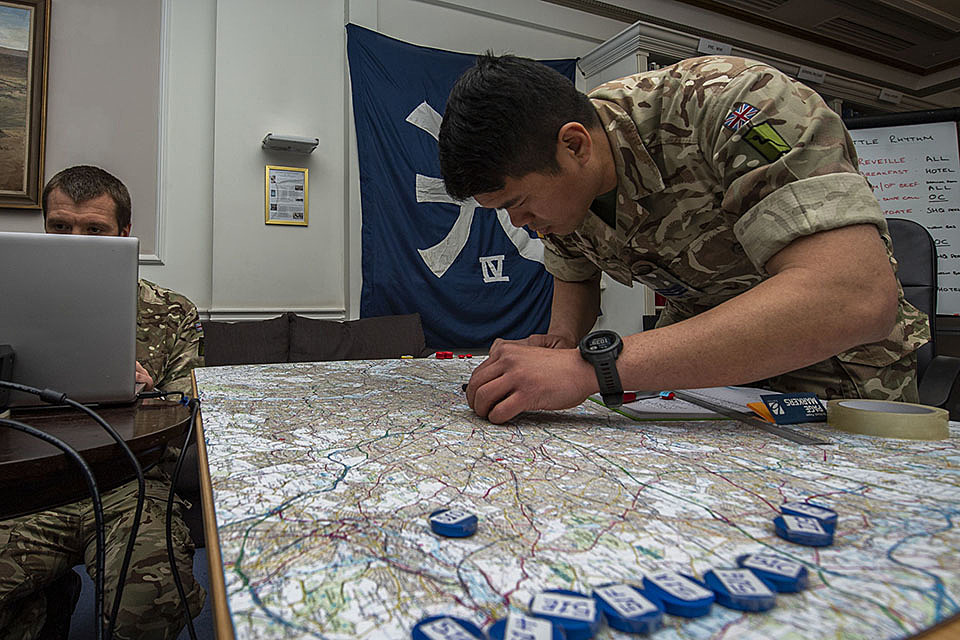
An Army Logistician plans distribution of ventilators. MOD Crown Copyright.
In addition, alongside the testing that they are carrying out on the virus, our scientists, based at the Defence Science and Technology Laboratory (DSTL) have also been deployed directly into government departments, local resilience teams and military headquarters, to provide instant assistance, insights and advice to planners and decision makers.
Since mid-February, DSTL have also deployed highly experienced microbiologists to increase the capacity of Public Health England and NHS Laboratories.
Working with our NATO partners
Since the outbreak began, we have been working hard to help NATO conduct an international response to the crisis. From the beginning of March, Defence Medical Services (DMS) have been at the centre of this collaboration, playing a key role in a workshop held by the Multinational Medical Co-ordination Centre. Here, they shared their experience across a range of fields, including humanitarian response.
DMS has also worked with NATO’s Science and Technology Organisation, and its Military Medical Centre of Excellence, providing speakers to weekly online conferences (on a variety of COVID-19 related topics) and supporting NATO’s ability to learn from the pandemic by sharing Defence’s organisational learning strategies.
Defence has also been active in supporting NATO’s efforts to combat the spread of harmful, false and misleading narratives, deploying two British Army experts to NATO’s new COVID-19 Communications Hub, where they are helping to lead the fight against disinformation.
Supporting the NHS
Supporting the National Testing Effort
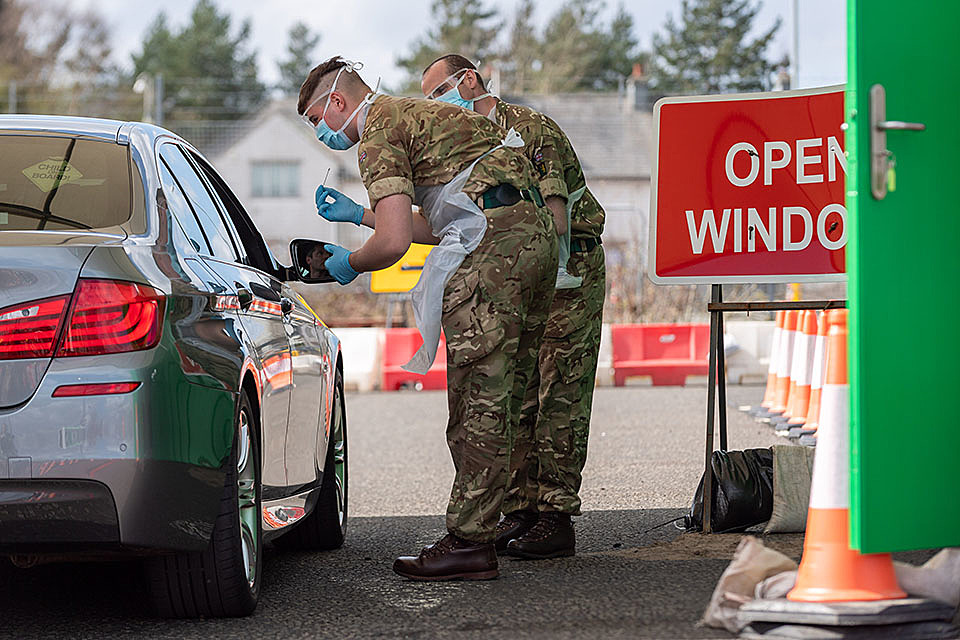
Soldiers assisting with the testing of NHS workers for COVID-19 in a new testing facility in Glasgow Airport. MOD Crown Copyright.
The UK Armed Forces have been supporting the government’s efforts to increase national testing capacity. Their efforts have included working with specialists from Boots Pharmacists to train testing personnel, the provision of military testers to Regional Testing Centres and the delivery of vital testing equipment.
Our scientists at the Defence Science and Technology Laboratory (DSTL) are also ready to play their part. If called upon, the Defence COVID Laboratory has the capacity to test at least 2000 samples a day, reporting results between 8 and 16 hours. It is part of a wider capability at Porton Down, where, in partnership with PHE, a total of up to 7000 tests per day can be taken.
Mobile Testing Units
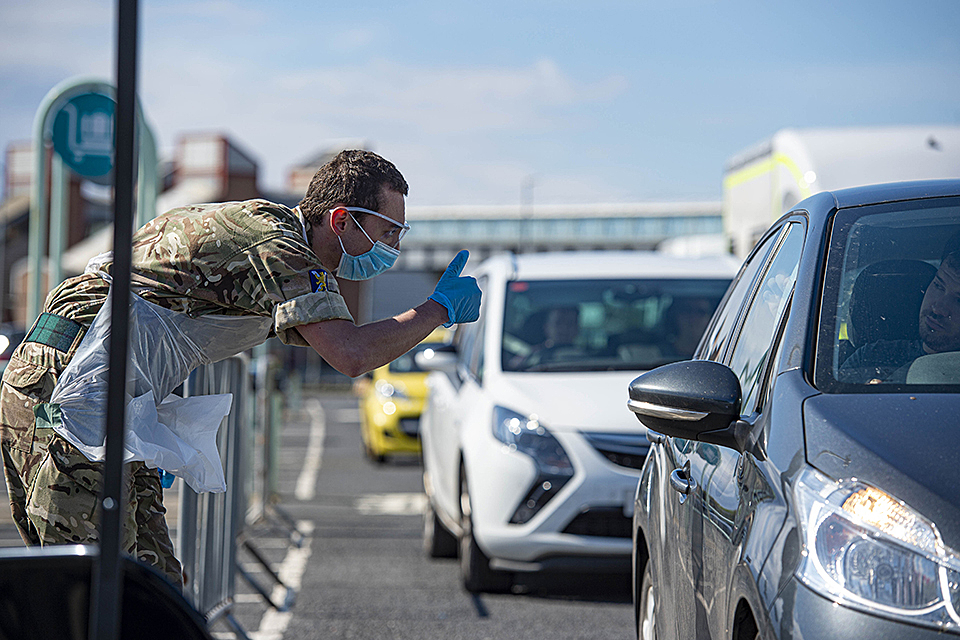
Soldiers from 6 SCOTS have run a Coronavirus Mobile Testing Unit in Prestwick Airport and Motherwell. MOD Crown copyright.
The Military have also helped to create a network of Mobile Testing Units (MTUs), which are travelling the country to reach symptomatic and eligible people at sites where there is a high demand for testing. Designed in partnership with British Army engineers, the units can be set up in less than 20 minutes, with each possessing the ability to test up to 500 individuals per day.
Working in combination with drive-through Regional Testing Sites, there are now multiple points of access to testing, which has helped to rapidly increase the number of tests carried out each day.
By the end of May, over 310,633 people had been tested by Mobile Testing Units alone.
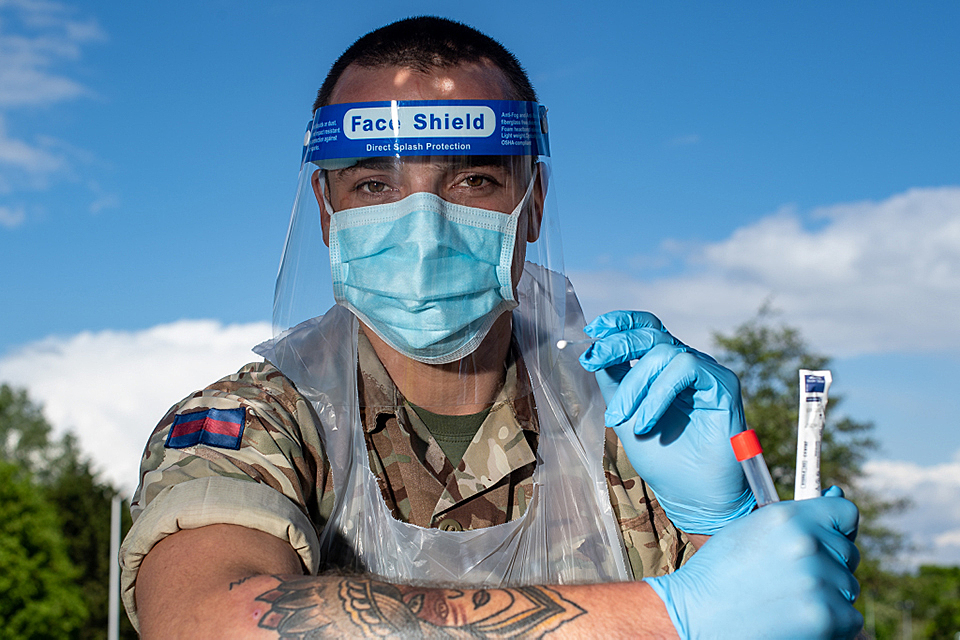
A soldier from 1st Battalion The Welsh Guards carrying out a COVID 19 test at a Mobile Testing Unit in Chessington. MOD Crown copyright.
Procurement of Personal Protective Equipment (PPE)
Over 100 staff from Defence Equipment & Support (DE&S) have been assisting the Cabinet Office and the Department of Health and Social Care in their efforts to identify and purchase PPE. To date, over 2 million items of PPE have been purchased from orders negotiated by DE&S staff.
In addition, the MOD’s Quality Assurance Field Force have also been doing their bit, making sure that any PPE sourced as part of this new supply meets the specification requirements for NHS and Social Care staff.
Delivering personal protective equipment (PPE)
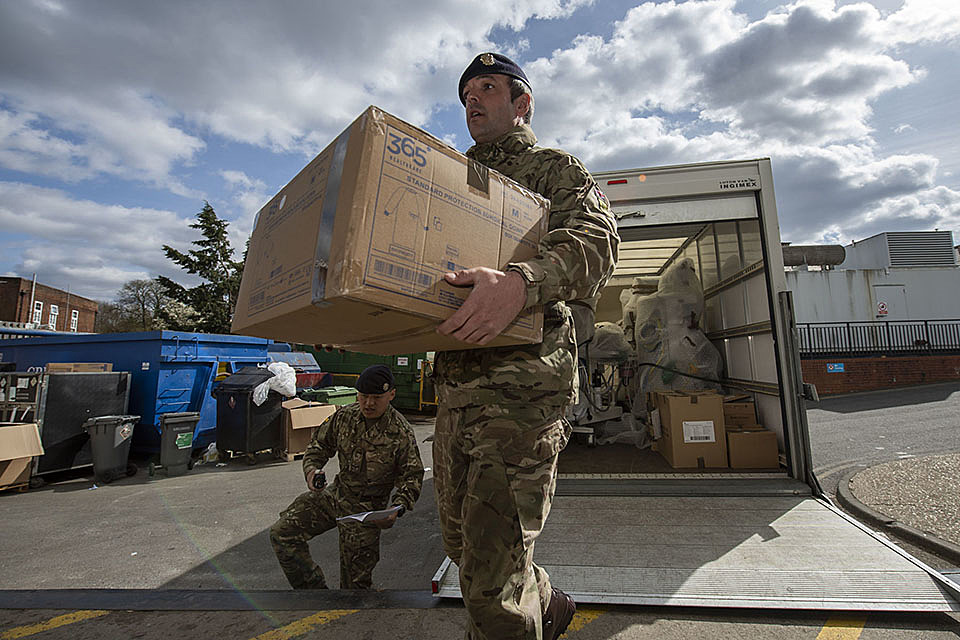
Soldiers from 4 Close Support Squadron drop off Personal Protective Equipment (PPE) at Epsom General Hospital. MOD Crown Copyright.
Military personnel are currently working to distribute PPE to NHS trusts and organisations across the country. Between 22 February and 8 May, UK Armed Forces personnel helped to deliver over 1.18 billion items of PPE to NHS staff on the frontlines in England. This includes 158m masks, 184 million aprons, 2.3 million gowns and 689 million gloves.
Tens of millions more PPE items have also been delivered to NHS trusts and organisations across the rest of the United Kingdom.
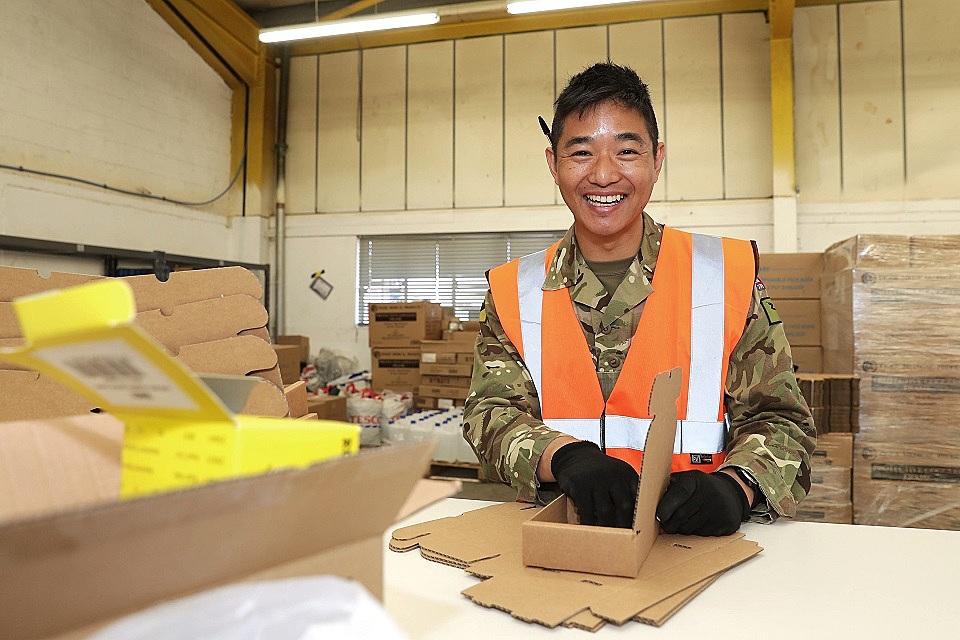
Corporal Santosh Gurung of the Royal Logistics prepares PPE to be handed out to local schools. MOD Crown Copyright.
4 members of the armed forces, drawn from the Royal Logistics Corps and the Royal Navy have been working with Portsmouth County Council and the Serve on the Community Team to store and package PPE. These packages will be delivered to schools around Hampshire when they reopen over the coming weeks.
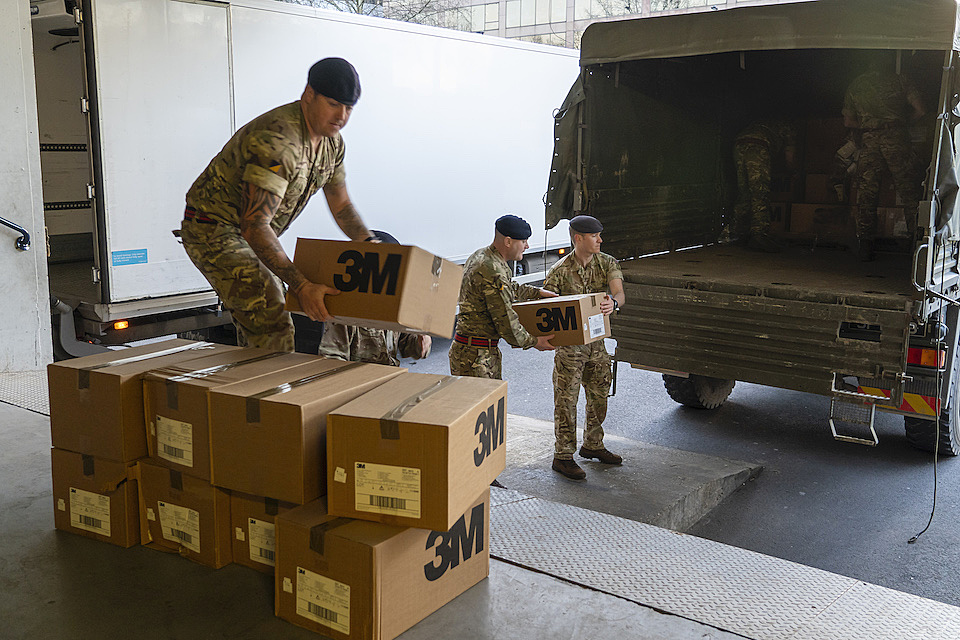
UK Armed Forces personnel delivered boxes of PPE to St. Thomas Hospital in London on 24 March. MOD Crown Copyright.
6 military specialists have also been deployed to assist NHS Greater Glasgow and Clyde with the fitting of FFP3 face masks. In doing this, they will help to make sure that our brilliant NHS staff get the protection that they deserve.
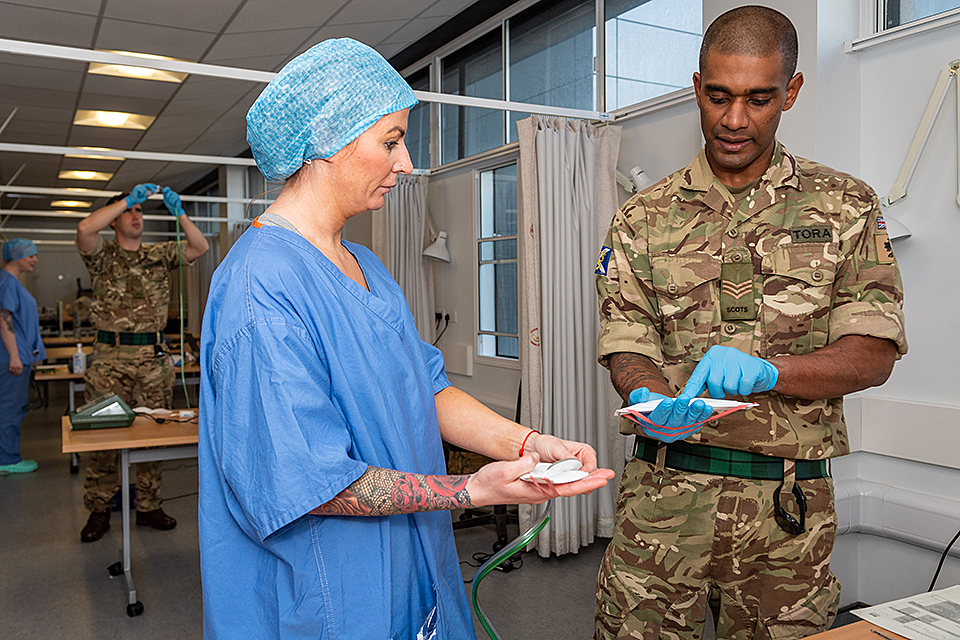
Scottish soldiers have been helping to fit the PPE NHS workers in Glasgow are using. MOD Crown Copyright.
Personnel from 3 Royal Welsh are also helping with the distribution of PPE at Cardiff Airport. So far, they have helped to unload 660,000 fluid resistant gowns, which have been flown in from China and Cambodia. They remain on standby to assist with further deliveries as and when needed.
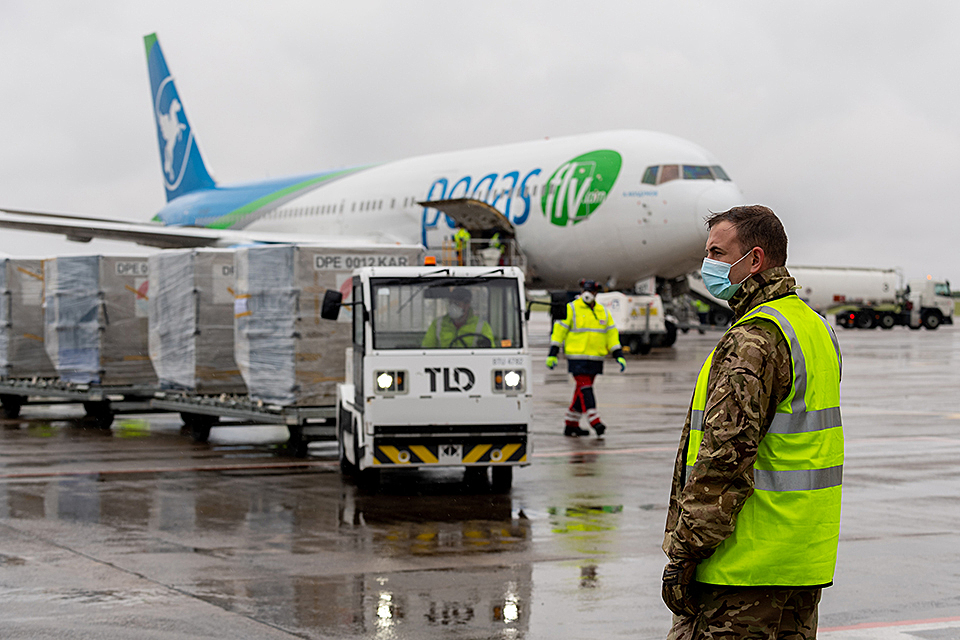
A soldier from 3 Royal Welsh prepares to load PPE into lorries for distribution to the NHS. MOD Crown copyright.
A small team from 4 Regiment Royal Logistics Corps are embedded within the civilian workforce at the NHS Supply Chain Hub in Daventry. Operating as part of a wider effort to create a new PPE supply chain for NHS Hospital Trusts and other healthcare providers, they are helping to organise and co-ordinate a new e-portal, which will allow customers to order PPE and receive it within 2 days.
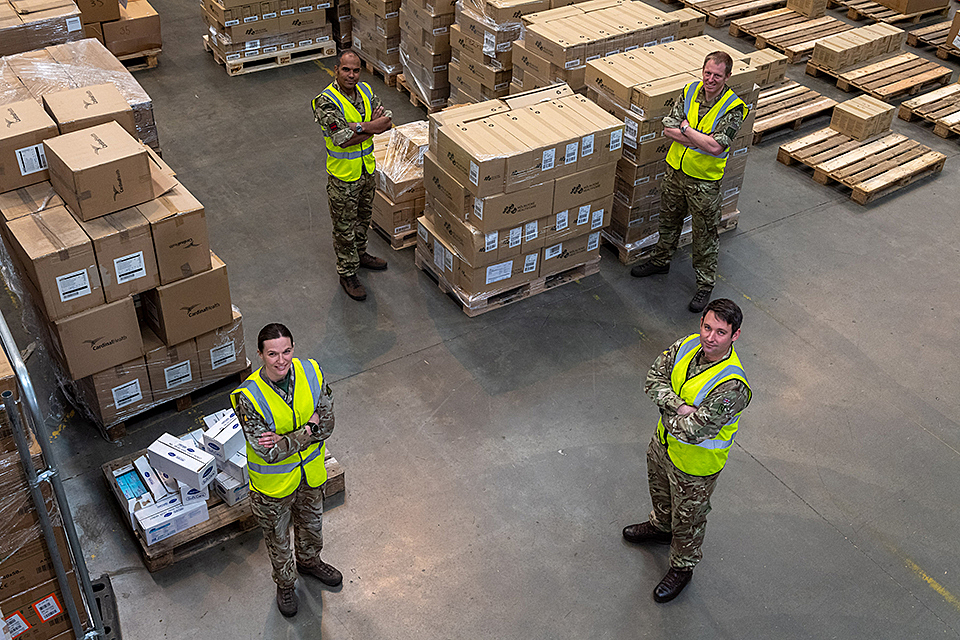
Members of 4 Regiment RLC are at the national NHS Supply Chain hub in Daventry. MOD Crown copyright.
PPE manufacturing
Personnel from across all three Armed Services have also been using 3-D printers to manufacture PPE components for their NHS colleagues on the frontline.
At HMNB Devonport and HMNB Portsmouth, Royal Navy personnel have been manufacturing headbands for facemasks in collaboration with other dockyard agencies. They are also being joined in this effort by a small Navy team at RNAS Culdrose, who have set themselves the target of producing 10,000 face shields for doctors, pharmacies, care homes and charities across Cornwall.
Meanwhile, Army personnel from 22 Engineer Regiment have also been producing face shields, whilst at RAF Odiham, the Chinook Support Centre have been manufacturing clips to enhance the comfort of masks when they are worn for long periods.
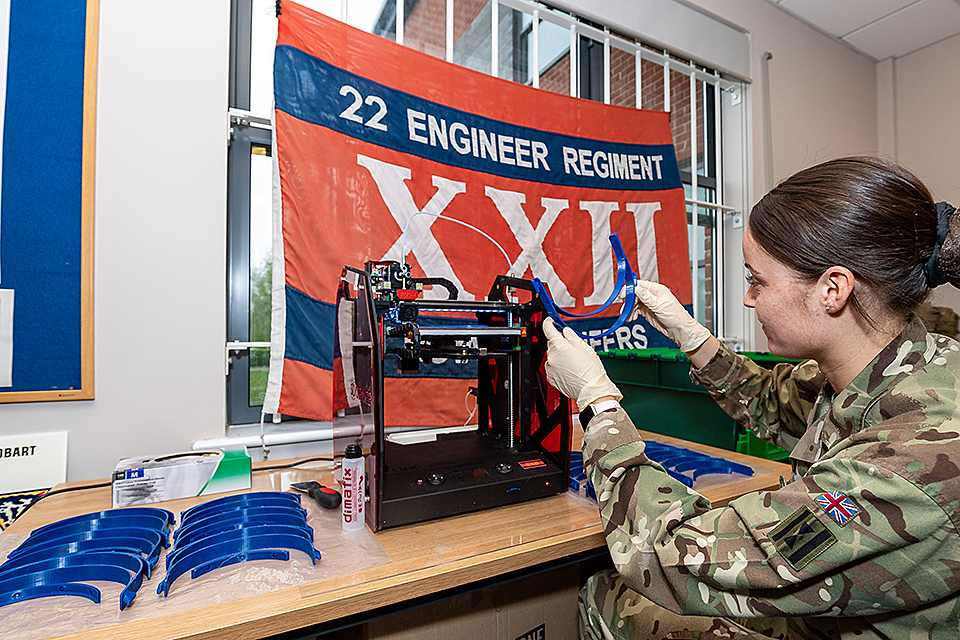
A soldier from 22 Engineer Regiment inspecting a 3D printed face shield adaptor for PPE. MOD Crown Copyright.
Delivery of testing kits to care homes
In addition, the COVID Support Force is also working with the Department of Health and Social Care to provide testing support to English care homes. Working in pairs, military crews are helping to ease the burden on carers, by dropping off and collecting testing kits, using vehicles with climate controlling capabilities. By 31 May, 38,285 tests had been collected by military teams.
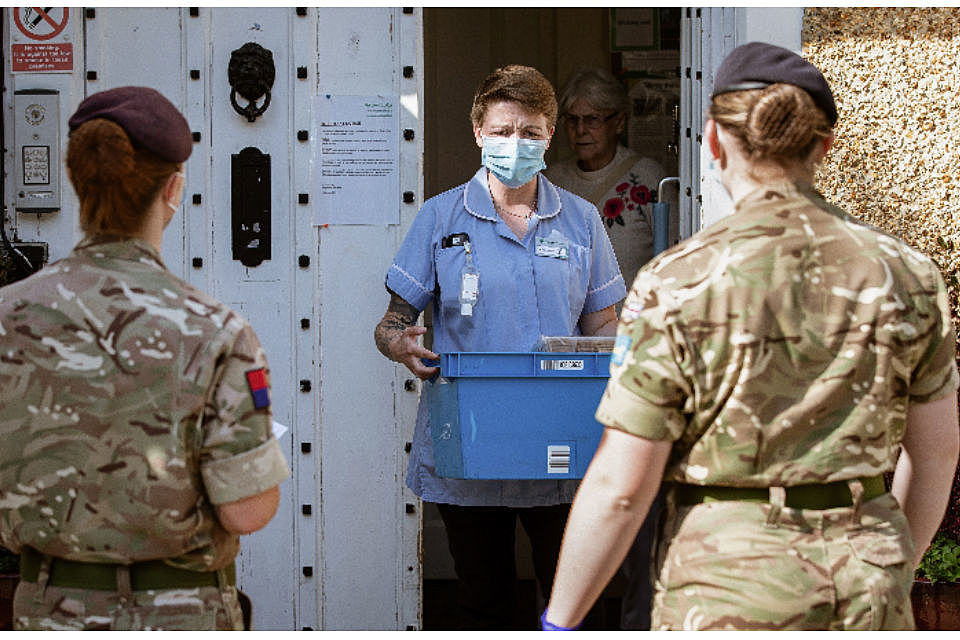
2 personnel from 12 Regiment Royal Artillery collecting mobile testing equipment from a Residential Home in Fareham. MOD Crown Copyright.
Ambulance support
Nearly 400 personnel have been mobilised to help support ambulance services across the UK. Drawn from all three services, they will provide support in a variety of roles, including driving emergency response vehicles and working in response centres. In most cases, the troops will not be providing paramedic care. However, they have all been trained in first-aid and trauma, which will mean they can support ambulance crews where required.
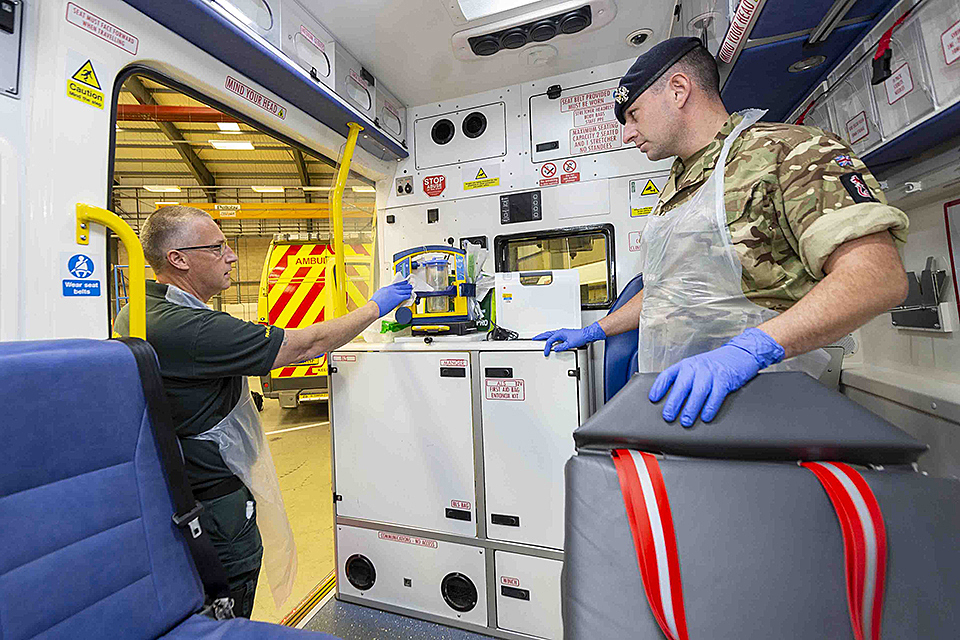
An NHS Paramedic shows a British Army soldier the importance of decontaminating the equipment in an ambulance. MOD Crown copyright.
So far, the military are providing support to the South Central Ambulance Service NHS Foundation Trust, the Welsh Ambulance Services NHS Trust, the London Ambulance Service NHS Trust, the East England Ambulance Service and the Scottish Ambulance Service.
Our personnel on the ground have also been supported by scientists based at DSTL, who have been exploring how the virus survives in aerosols across different environments. Working with the Defence and Security Accelerator (DASA), they have trialled cutting-edge technology from industry to dramatically speed up the time it takes to decontaminate an ambulance to a matter of minutes.
Temporary NHS hospitals
In recent weeks, we have been supporting the NHS to open new hospitals around the country, providing infrastructure, logistics and project management advice.
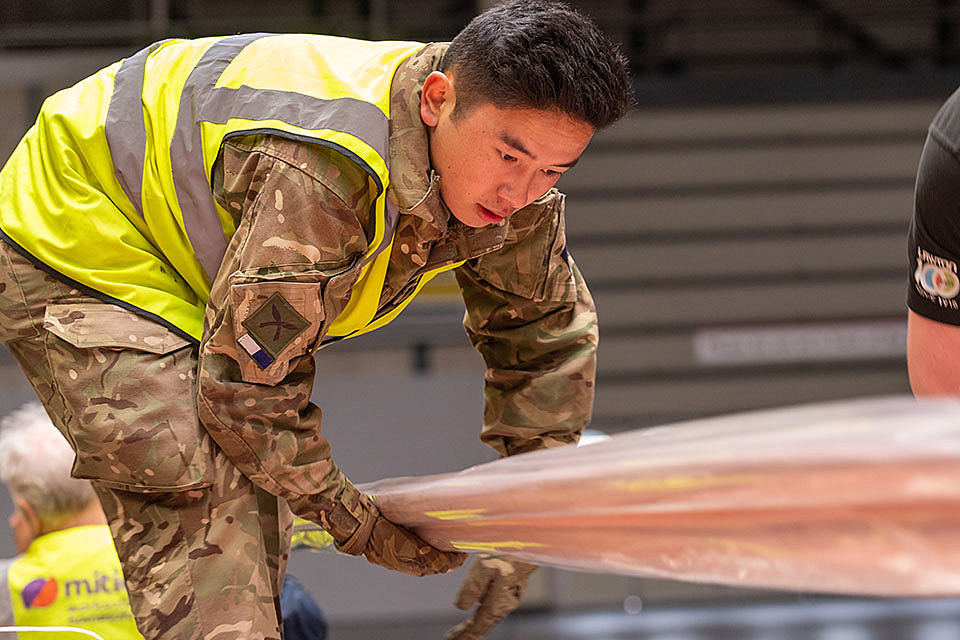
A soldier from Queens Royal Ghurkas unloads copper piping for construction of NHS Nightingale in Birmingham. MOD Crown Copyright.
Since the first new Nightingale hospital in East London was constructed in just 9 days by NHS staff, military personnel, civilian contractors and volunteers, facilities have been made ready across the UK. So far, the military have supported builds at:
- London Excel – 500 beds initially, with a potential maximum of 4,000 beds
- Birmingham – 500 beds initially, with a potential maximum of 2,000 beds
- Manchester – 500 beds initially, with a potential maximum of 1,000 beds
- Harrogate – up to 500 beds in total
- Bristol – up to 300 beds initially, with a potential maximum of 850 beds
- Exeter – up to 400 beds in total
- Military personnel also supported the Scottish Government and NHS Scotland to determine how the Scottish Exhibition Centre could be transformed into a temporary hospital.
- Servicemen and women were also deployed to the Principality Stadium in Cardiff to assist with the building of beds at the Dragon’s Heart Hospital.
Our scientists at DSTL have also supported the effort, developing a ‘fit-testing kit’, which ensures that PPE fits frontline medial workers. This not only enabled the new Nightingale hospitals to open on schedule, but has helped to support the entire NHS system over the past month.
Military personnel are also being deployed to assist NHS staff at the new hospitals, carrying out a wide range of clinical support activities, such as porterage, internal patient moves, helping medical staff to robe and disrobe with their PPE, equipment maintenance and stores management.
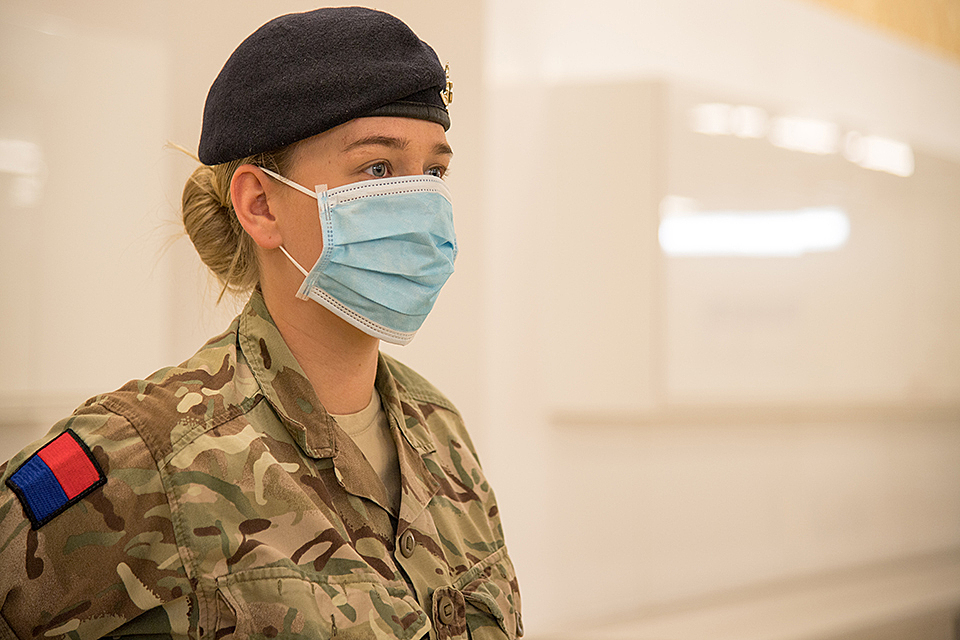
A soldier assisting at the NHS Nightingale Hospital in Harrogate, North Yorkshire. MOD Crown copyright.
All personnel have received specific training for their roles, which includes the fitting and appropriate use of PPE and familiarisation training to the medical facility to which they are assigned.
Ventilators
Thousands of items of life-saving medical equipment and over 2,700 ventilators, have been distributed to NHS hospitals as part of the ongoing UK government response to the COVID-19 outbreak.
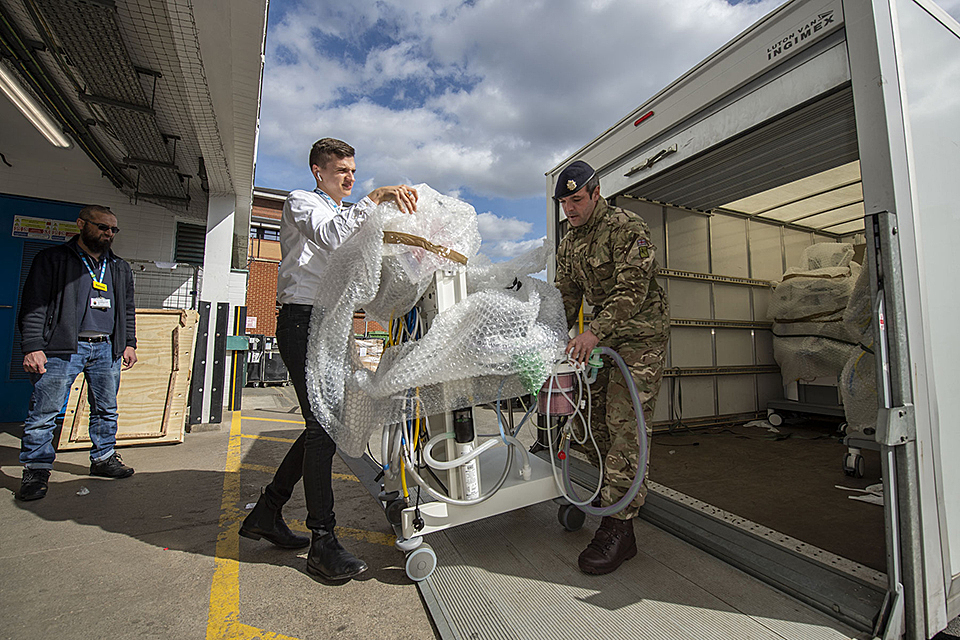
4 Close Support Squadron are delivering ventilators to the NHS. MOD Crown copyright.
The majority of this support has come through the Defence Equipment & Support (DE&S) fulfilment centre, based at MOD Donnington. The Centre has now dispatched over 1,000 ventilators to NHS hospitals, and is holding over 1,400 more in stock to be deployed as required. To date, DE&S have also distributed over 7,500 items of critical medical equipment, including oxygen concentrators and humidifiers to the NHS.
In Hampshire, RAF Odiham has also been supporting the production of ventilators, providing storage space for medical ventilator trolleys before they enter the next phase of assembly, as required by demand on production. The trolleys have been produced by a civilian consortium, supported by brands that include McLaren and other F1 Teams. The consortium is aiming to produce 15,000 new ventilators by the end of June 2020.
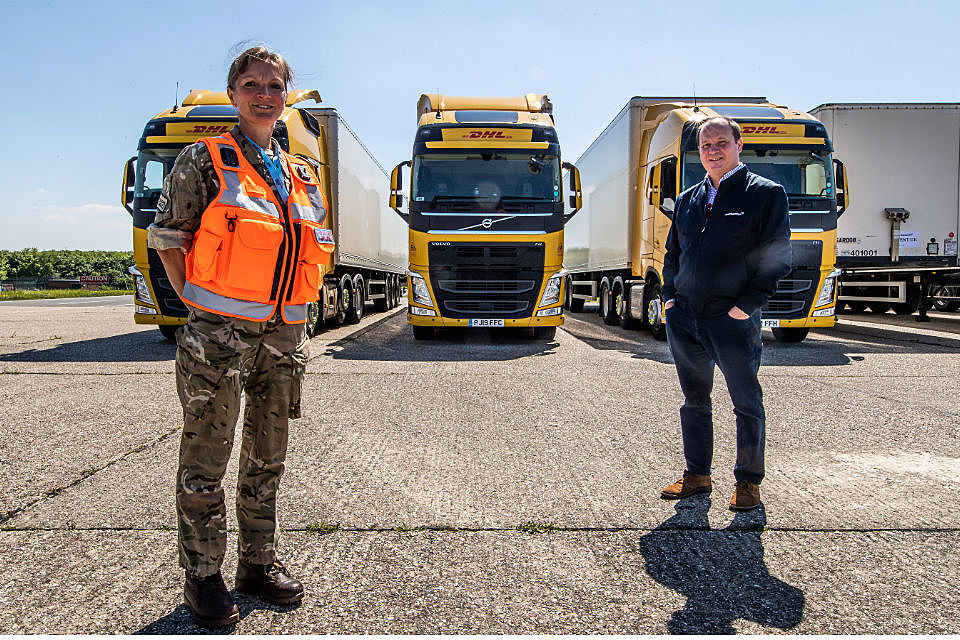
Squadron Leader Donna Rogerson has been assisting with the storage of ventilators at RAF Odiham. MOD Crown Copyright.
Aviation task force
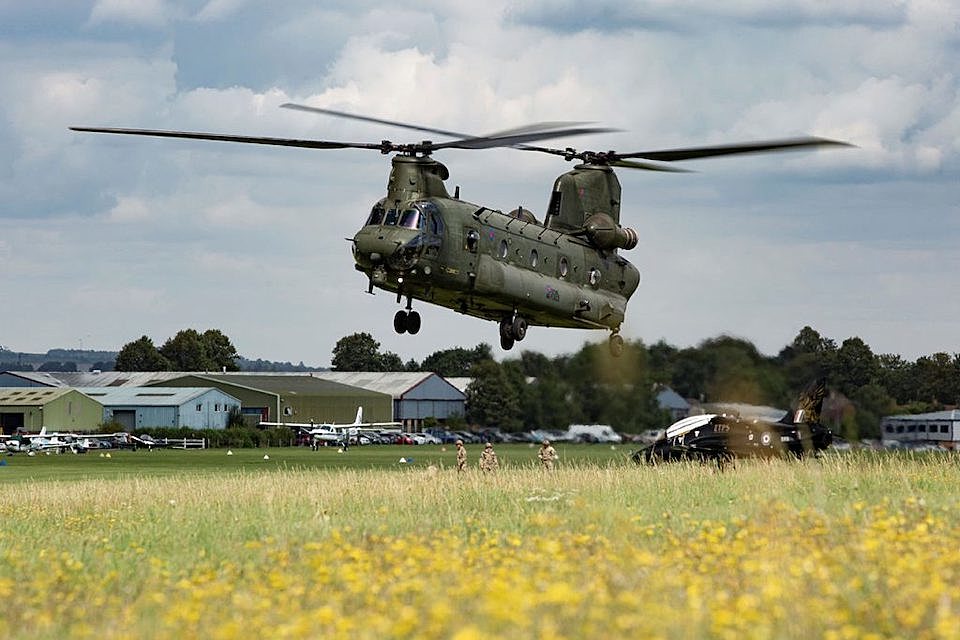
Royal Air Force Chinooks will support the work of Joint Helicopter Command. MOD Crown Copyright.
As part of the military’s response to the COVID-19 crisis, forces from Joint Helicopter Command are on standby to provide aviation capability in support to civil authorities.
A new COVID Aviation Task Force has also been established to support the government’s response to coronavirus when requested.
So far, military aircraft have provided assistance in a range of activites. This has included, training key workers in various locations around the Western Hebrides in medical evacuation procedures and supporting NHS staff in the trial of the Epishuttle system, which will enable the safe and swift transportation of patients to emergency care facilities. In addition, they have also assisted with 5 medical evacuations in England and Scotland.
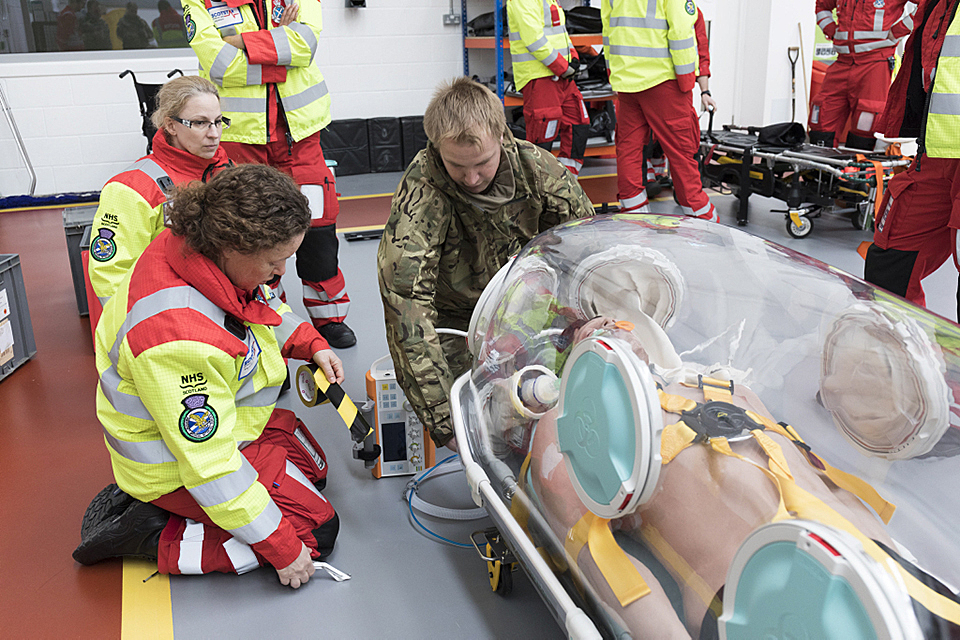
The aviation task force deployed at Kinloss EpiShuttle train with the Scottish Ambulance Service. MOD Crown Copyright.
Aviation Task Force aircraft have also been helping to transport NHS staff around the UK. Last week, a Chinook helicopter was deployed to transport workers to the NHS Nightingale hospitals in Bristol, Harrogate and Sunderland to carry out assurance testing and ensure that they could open on time.
These helicopters may be seen operating in all areas of the UK, either conducting essential preparations or supporting the NHS. Given the sensitive nature of some of these tasks, it would be inappropriate to give further details.
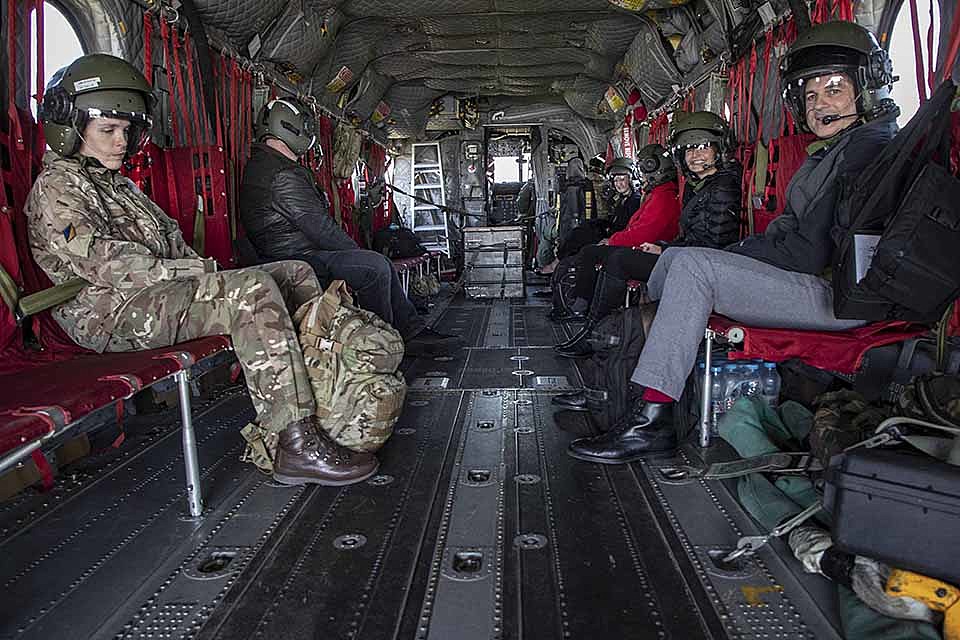
RAF Chinook transporting NHS Staff to multiple locations around the UK. MOD Crown copyright.
Northern Ireland medical evacuations
A RAF A400M aircraft has supported a medical evacuation from Northern Ireland to the UK mainland. The patient was taken from Aldergrove to East Midlands Airport following a request for assistance, and is now receiving the care needed to treat their condition. Medical specialists were on board to attend to the patient throughout the transfer. This is the second time military aircraft have assisted with a medical evacuation from Northern Ireland since the start of the Coronavirus pandemic.
RAF Leeming COVID-19 App Trials
RAF eXperimental (RAFX), the digital unit at RAF Leeming in North Yorkshire, have been working closely with NHSX and partners to develop a smartphone app that could prevent the spread of COVID-19.
Personnel at the base are currently trialling the new app, which uses Bluetooth software to determine a user’s proximity to other devices.
If a person displays symptoms, they can choose to share this information with the NHS via the app, which will then alert other users with whom they have been in close proximity.
Oxygen tanker drivers
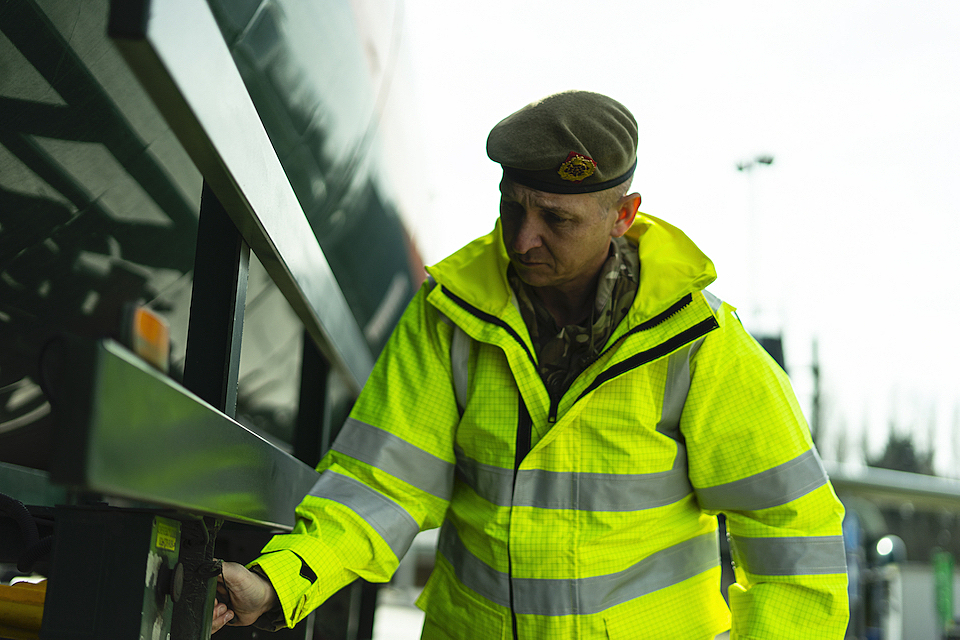
Colour Sergeant Nick Barber is taking part in training to drive oxygen tankers in support of the NHS. MOD Crown Copyright.
UK Armed Forces personnel, drawn from each of the three Services, began training to drive oxygen tankers at Air Products facilities in Carrington and Port Talbot. 39 drivers and 63 driver’s mates have now completed the process and are now able to fill tankers, drive them safely and deposit their cargo at NHS facilities.
Mortuaries
We are working with local communities to undertake contingency planning so we can ensure the public are kept safe and that any tragic loss of life will be treated with the utmost respect and care. As a result, we have identified some potential sites that may be used to facilitate temporary mortuaries.
Protecting communities
Supporting medical facilities
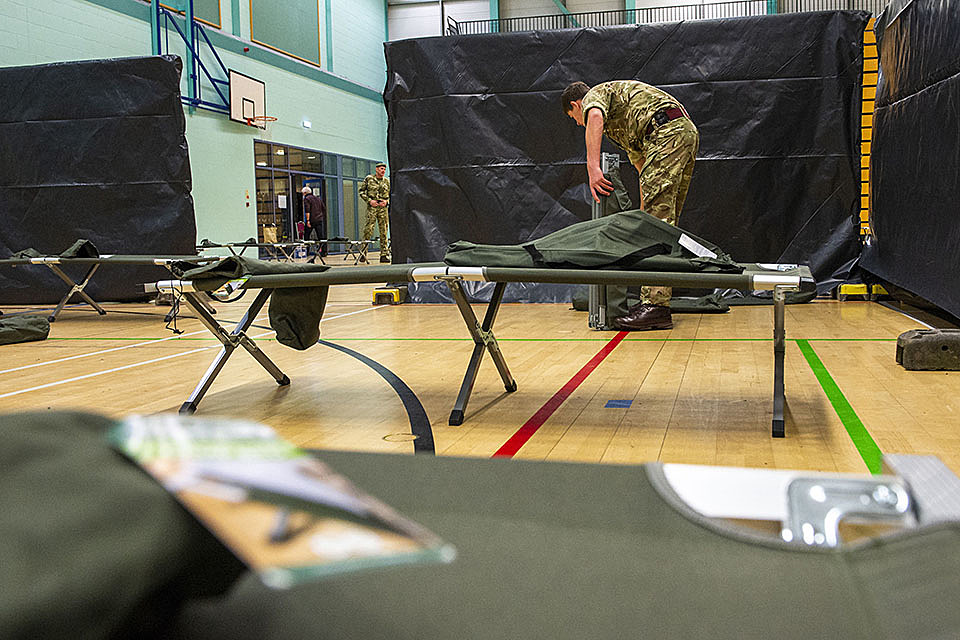
Military personnel have been helping to install medical equipment at temporary Patient Recovery Centres in Cumbria. MOD Crown Copyright.
Across the UK, service personnel have been helping local authorities to increase the capacity of their medical facilities. This has included efforts to construct beds at the Principality Stadium, Cardiff, and St Mary’s Hospital on the Isle of Wight.
Military personnel have also provided support in Cumbria, helping to set up 5 temporary Patient Recovery Centres, which will act as a halfway house for patients who have been discharged from hospital, but are not well enough to return home. Through all of these efforts, the military have supported in the provision of over 1,000 extra beds.
Support to overseas territories
The government is working closely with British Overseas Territories to ensure they receive the help they need to manage outbreaks of COVID-19.
This has included the provision of 175 personnel to Gibraltar, to support with the delivery of food and medicine to residents, and the delivery of 310kg of PPE to Ascension Island and St Helena.
The Caribbean
Inspired by our co-ordination during previous hurricane seasons, the MOD have formed a new military co-ordination cell with our French and Dutch allies, optimising our support for OT in the Caribbean as they co-ordinate their response to COVID-19.
As part of this offering, RFA Argus is stationed in the region. She was already scheduled to provide support during the upcoming hurricane season, however she will now work alongside PHA Dixmude from France and HNLMS Karel Doorman from the Netherlands, providing help with the response to the Coronavirus pandemic if required.
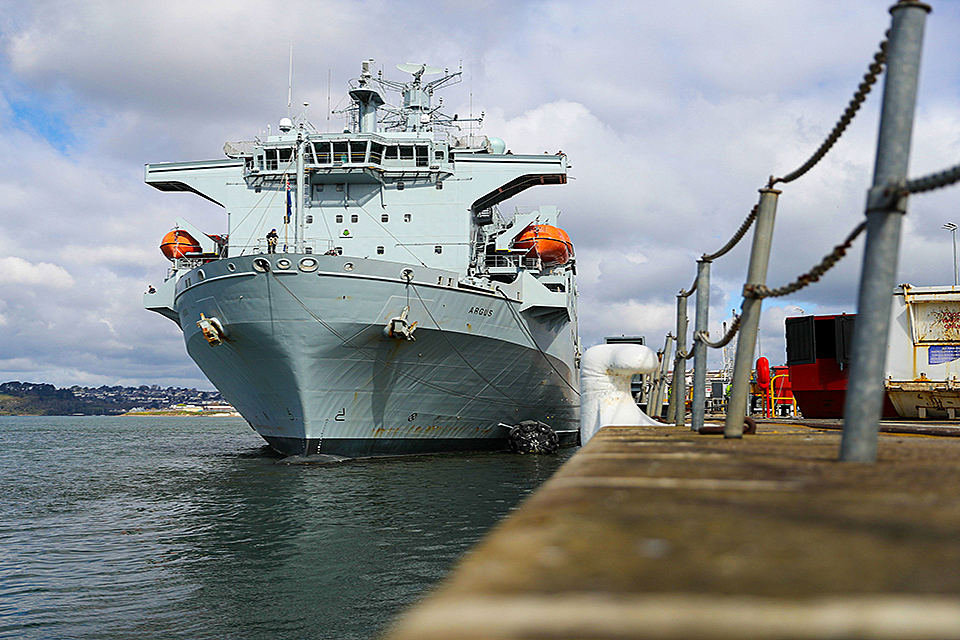
RFA Argus at HM Naval Base Devonport, before setting sail for the Caribbean. MOD Crown Copyright.
The Ministry of Defence have also deployed small security assistance teams to both the Cayman Islands and the Turks and Caicos Islands. Each team will reinforce the capacity of local police and support local authorities as they plan for and mitigate against any security issues caused by the Coronavirus outbreak.
On 8 May, the RAF delivered Foreign Office sourced supplies to the Turks and Caicos Islands. The delivery included 6 ventilators, blood supplies and medication, all of which will help to support the islands’ healthcare system during the Coronavirus pandemic.
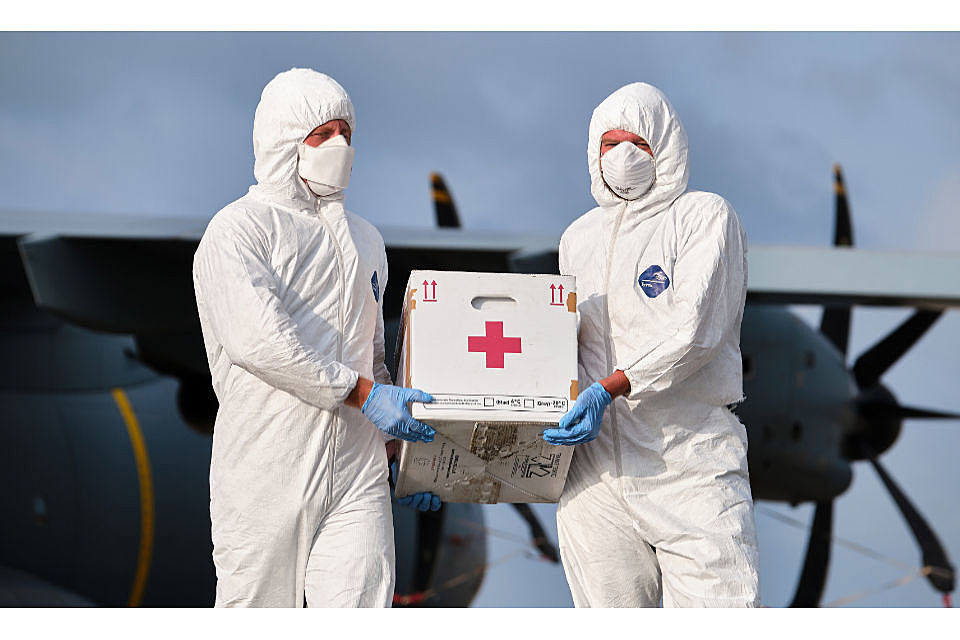
Medical supplies being unloaded in the Turks and Caicos Islands. MOD Crown Copyright.
The Falkland Islands
Children from the Falklands, who attend school in the UK and were stranded by flight cancellations, were given priority travel home on the South Atlantic Airbridge, a frequent direct air service, owned and operated by the MOD.
Alongside a military planning team, already in situ, the MOD has deployed a small medical team, and 2 Intensive Treatment Units, to support the islands’ medical facilities.
In addition to supplies of oxygen, medicine and PPE, the UK Armed Forces have also delivered essential equipment to the Falkland Islands to enable the construction of an oxygen generation plant to increase the supply of oxygen to King Edward Memorial Hospital. A Royal Air Force C-17 Globemaster delivered the equipment to British Forces South Atlantic Islands as part of the UK government’s support to the Overseas Territories during the coronavirus pandemic.
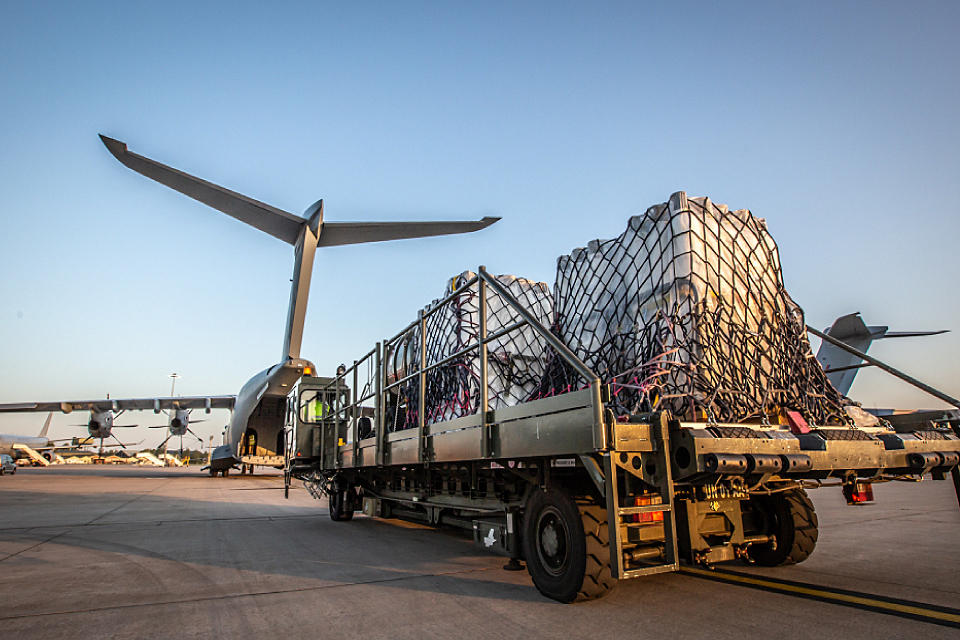
A NOX Tank is unloaded in the Falklands. MOD Crown copyright.
Gibraltar
Around 175 military personnel have been deployed to Gibraltar to help with planning and logistics, as well as the delivery of food and medicine to residents. We are working closely with the hovernment of Gibraltar to understand their requirements and are considering an additional request for support from the Royal Gibraltar Regiment.
At the beginning of April, the RAF delivered 70 kg of PPE to Ascension Island, alongside an additional 240 kg of PPE for onward transport to St Helena. This was part of the UK governments commitment to the Overseas Territories.
Repatriation flights
The UK Armed Forces have assisted with the small scale repatriation of British citizens during the Coronavirus pandemic. In early April, an RAF Voyager, returning from the Falklands, repatriated a number of nationals from Senegal. They were picked up whilst the aircraft refuelled in West Africa.
Meanwhile, in Nepal, British Army Gurkhas have been assisting the return of holidaymakers who were stranded in remote parts of the country. Over a period of 3 weeks, the soldiers, in collaboration with British embassy staff and local drivers, travelled over 4,000 miles through the Himalayas to 13 different districts. In all, they managed to retrieve 109 British citizens and 28 foreign nationals.
The military’s main contribution has, however, been assisting the Foreign and Commonwealth Office with repatriation flights from a range of countries, allowing British citizens to return home safely. So far, the UK Armed Forces have deployed an operational liaison and reconnaissance team to aid with planning, supplied medically trained personnel and provided a military runway for aircraft returning to the UK.
The RAF has also assisted the Foreign Office in the rescue and repatriation of 12 conservationists from the Royal Society for the Protection of Birds. When the pandemic began, the birdwatchers were stranded on an isolated island, a full 12 days sail from the Ascension Islands. Having returned to base, they were flown back to Brize Norton by an RAF A400M Atlas, which had been resupplying the islands as part of a continuous airborne link.
Related information
For more information please visit the Coronavirus (COVID-19): what you need to do guidance page on gov.uk.
For most people, coronavirus (COVID-19) will be a mild illness. However, if you have any symptoms you should self-isolate at home and get a COVID-19 test.
Updates to this page
-
Updated content under the 'Latest News' heading and the 'Mobile testing' heading.
-
Updated the page in accordance to the MOD's coronavirus (COVID-19) support contributions as of 28 May 2020.
-
Added the link to the COVID-19 arrange a test page under the 'related information' heading.
-
Updated the page in accordance to the MOD's coronavirus (COVID-19) support contributions as of 21 May 2020.
-
Updated the page in accordance to the MOD's coronavirus (COVID-19) support contributions as of 18 May 2020.
-
Updated to reflect position on 15 May
-
Updated to include the latest medical evacuation in Northern Ireland.
-
Updated information on 12 May
-
Updated to reflect the situation on 11 May
-
Updated to reflect numbers on 4 April and to include active Mobile Testing Units.
-
Updated for 28 April
-
updated to reflect state of play on 27 April
-
Updated the COVID-19 support information as of 24 April 2020.
-
Updated to reflect the state of play on 23 April
-
Updated to reflect the situation at 21 April - deployments to Nightingale facilities and 3D printing.
-
Updated to reflect the position on 16 April.
-
Removing an error
-
Adding information about a medical evacuation in the Orkney Islands
-
Updated for 2 April
-
Added a notice about the mobilisation of reservists to support its response to Covid-19.
-
Updated to reflect position on 30 March
-
Addition to the Supporting NHS section
-
Adding information on the enforcement of public order
-
Adding information on helicopter support to Scotland
-
Updating a small paragraph
-
Amendments to existing updates
-
Update to inform public of additional progress made by the COVID support force to PPE distribution.
-
Adding further information on repatriations and support to the Falkland Islands
-
Adding information on military planning in the home nations.
-
Adding information on the NHS Nightingale Hospital
-
Adding further detail on where oxygen tanker driver training is taking place
-
Adding details on support to the Government of Gibraltar
-
Adding more information on oxygen tanker driver training
-
Added photography of personnel delivering PPE to a hospital.
-
Adding a link to an external blog post.
-
First published.